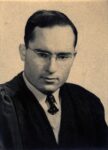A Complicated Man
 My father was a dichotomy wrapped in dysfunction. He was a type A “glad-hander” – always ready to shake your hand with a big smile whether he knew you or not. But he couldn’t pay a compliment to save his life. He was a strict disciplinarian whose approach to “spare the rod, spoil the child” ensured we would never feel spoiled. But he provided us with the tools of play (toys) that would (in my case anyway) activate our imagination and encourage creativity.
My father was a dichotomy wrapped in dysfunction. He was a type A “glad-hander” – always ready to shake your hand with a big smile whether he knew you or not. But he couldn’t pay a compliment to save his life. He was a strict disciplinarian whose approach to “spare the rod, spoil the child” ensured we would never feel spoiled. But he provided us with the tools of play (toys) that would (in my case anyway) activate our imagination and encourage creativity.
The sad thing is that his harsh discipline and negative criticism have had a far more lasting effect on my life than any of the good memories. I think what affected me the most was that it seemed his only way to encourage excellence was to point out that not achieving excellence doomed me to a life of failure. At some point, I think I came to the conclusion that I would never achieve his level of perceived excellence, so I simply stopped trying thus fulfilling (in both his and my eyes) his expectation that I would end up being “good for nothing.”
Looking back on his life from my perspective as an adult, I have begun to appreciate what might have motivated my father to think and act the way he did. I suspect learning did not come easily to him — he didn’t graduate high school until he was 20, graduating in the same class as his younger sister. According to my mother, he barely passed his ordination as a minister. He served as a missionary in Japan but never was as effective as he could have been because he failed to learn the language enough to do without an interpreter. When my mother was denied medical clearance to return to Japan in 1958 and we settled in California, my father struggled to find his way. I suspect he saw himself as something of a failure in his capacity as a provider and by not being able to fulfill what he saw as his calling.
In spite of all that, my father was well-liked and highly respected in both our neighborhood and our church community. He served as a church deacon and was a long-standing chair of the missionary committee. He had a life-long issue with hypertension that ultimately led to a debilitating series of strokes. A serious stroke in 1986 left him with aphasia and disinhibition. While he could speak, he could no longer read or write. His brain made him see garbage instead of words. The lack of inhibition led to him publicly exposing himself, which ultimately led to police involvement much to my mother’s horror. It is indicative of the great respect our neighbors had for my father – and their understanding that this was a symptom of his stroke – that they never made an issue of it. The police were shocked to discover that all the neighbors knew but did nothing!
Before the police could finish their investigation, my father suffered a final stroke that led to his death from complications. His memorial service was attended by several hundred people who had known him over the years and he is now buried in the family cemetery at Larlee Creek Baptist Church in Perth-Andover, New Brunswick.
